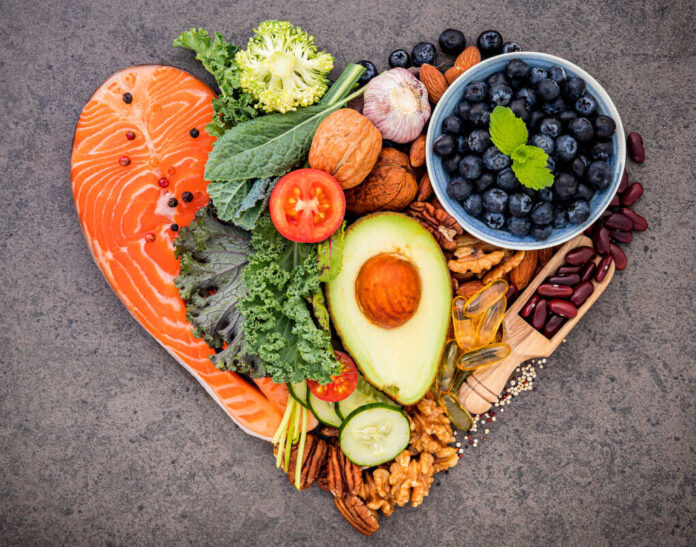
Tirelessly beating from before birth until the end of life, the heart is the engine of the human body, driving the circulation of blood that carries essential nutrients and oxygen to every cell.
Amidst a backdrop of rising cardiovascular diseases globally, the role of diet in maintaining heart health cannot be overstressed.
The connection between what we eat and how well our heart functions is profound, with certain foods playing a pivotal role in strengthening the heart muscle, reducing the risks of heart disease, and promoting overall cardiovascular health.
1. Whole Grains
Whole grains like oats, brown rice, quinoa, and whole wheat, are foundational to a heart-healthy diet. They are rich in essential fibers, which help lower cholesterol levels by binding to it in the digestive system and removing it from the body. This process helps prevent the buildup of plaques in arteries, reducing your risk for heart disease and stroke.
2. Leafy Green Vegetables
Leafy green vegetables such as spinach, kale, and collard greens are powerhouses of vitamins, minerals, and antioxidants. They are especially high in vitamin K, which helps promote proper blood clotting and protect arteries from damage. Their high content of dietary nitrates has been shown to reduce blood pressure, enhance the efficiency of the heart muscle, and improve arterial function.
3. Berries
Berries, including strawberries, blueberries, blackberries, and raspberries, are delicious and loaded with anthocyanin antioxidants, which protect against oxidative stress and inflammation damage that contribute to heart disease. Regular consumption of berries has been linked to a reduction in several risk factors for heart disease, including blood pressure and cholesterol levels.
4. Avocados
Avocados are an excellent source of heart-healthy monounsaturated fats. These fats improve heart health by lowering levels of bad LDL cholesterol while also increasing levels of good HDL cholesterol. Avocados also provide a rich source of potassium, a mineral essential for blood pressure regulation.
5. Nuts and Seeds
Nuts like almonds, walnuts, and peanuts, and seeds like flaxseeds, chia seeds are
nutrient-dense foods that contain a mix of monounsaturated fats, omega-3 fatty acids, and fiber. These components work together to decrease LDL cholesterol, reduce inflammation, and lower blood pressure. They also provide antioxidants that support heart health.
6. Legumes
Legumes, including beans, lentils, and peas, are great sources of protein that don’t come with the high saturated fat content often found in animal proteins. They are high in fiber, antioxidants, and phytonutrients that help reduce heart disease risk factors like high blood pressure and cholesterol.
7. Fatty Fish
Fatty fish such as salmon, mackerel, tuna, sardines, and trout are rich in omega-3 fatty acids, known for their benefits in reducing inflammation throughout the body, lowering blood pressure, and decreasing triglyceride levels. Incorporating fatty fish into meals a few times a week can significantly benefit heart health.
8. Garlic
Garlic has been used for millenia for its medicinal properties, including its ability to improve heart health. It contains allicin, a compound that has been shown to lower blood pressure and cholesterol levels, reducing the risk of heart disease.
9. Olive Oil
Extra virgin olive oil is a key element in the Mediterranean diet, which is well known for its heart health benefits. It’s high in monounsaturated fats and antioxidants, which help lower bad LDL cholesterol and reduce the risk of heart disease.
10. Dark Chocolate
Dark chocolate is not only a delicious treat but also a heart-healthy one when consumed in moderation. It contains flavonoids, which are antioxidants that help improve heart health by lowering blood pressure and potentially improving blood flow to the heart and brain.
11. Green Tea
Green tea is rich in antioxidant polyphenols and catechins. These may improve heart health by enhancing blood vessel function and lowering inflammation. Regular consumption of green tea is closely associated with a lower risk of heart disease.
12. Tomatoes
Tomatoes are rich in the antioxidant lycopene. Lycopene is linked to heart health benefits, including reducing your risk for heart disease and stroke. They are also a good source of vitamin C, potassium, and fiber, which are important for maintaining heart health.
13. Whole Soy Foods
Whole soy foods like tofu, seitan, tempeh, and edamame are excellent sources of protein, fiber, vitamins, and minerals. Soy protein can potentially help lower blood cholesterol levels, and it has been linked to a reduced risk of heart disease.
Each of these foods offer unique benefits that contribute to the overall functioning and health of the cardiovascular system, showcasing the power of diet in the fight against heart disease.
Prioritizing these foods within a balanced and nutritious diet, alongside regular physical activity and healthy lifestyle choices, can pave the way to optimal heart health and a longer, vibrant life.






















